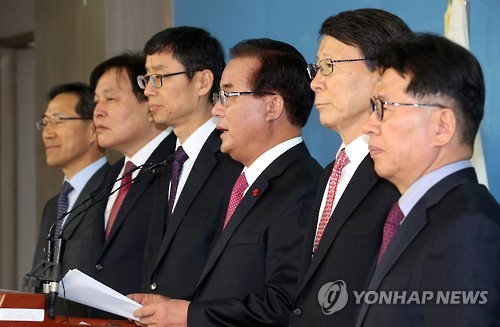More than half of exporters in South Korea are against a proposed revision to the commercial law aimed at limiting the power of large shareholders in their respective firms that often comes at the expense of smaller shareholders, a survey showed Monday.
In a recent survey conducted by the Korea International Trade Association, 50.5 percent of heads of 791 local export companies said they were against the revision currently sought by opposition parties.
 |
Rep. Jeong Kap-yoon (third from R, independent) holds a press conference at the National Assembly in Seoul on Feb. 14, 2017, to express his opposition to a proposed revision to commercial law. (Yonhap) |
Another 31.8 percent answered the political parties must be extremely careful when pursuing such a change, while only 8.5 percent said they saw a need for the revision.
The opposition-proposed revision largely aims to reform chaebol, or family-run conglomerates, in which families of those who have founded such firms occupy top managerial posts, and thus control the firms, often with a considerable amount, but rarely a controlling amount, of stakes arranged in cross-shareholding schemes.
The revision, if legislated, seeks to further prohibit cross-shareholding ties between subsidiaries, a move partly aimed at keeping the voting rights of large shareholders proportionate to their stakes.
KITA, however, said a majority of local exporters, or at least their heads, were against such a move, noting it could hinder their decision-making process.
"The survey, in which 82 percent of respondents said they were either opposed against or cautious about the revision, shows that the revision could undermine business conditions for all firms, regardless of their size, despite its original goal of creating a fair and rational business environment by improving the ownership structure of companies," it said in a press release.
KITA said the outcome of the survey will be delivered to the floor leaders of both ruling and main opposition parties, as well as the heads of related parliamentary committees.
An earlier report from a local association of small and medium-sized firms noted only about 14 percent of all listed companies were family-owned or operated chaebol. (Yonhap)








![[Today’s K-pop] Blackpink’s Jennie, Lisa invited to Coachella as solo acts](http://res.heraldm.com/phpwas/restmb_idxmake.php?idx=644&simg=/content/image/2024/11/21/20241121050099_0.jpg)